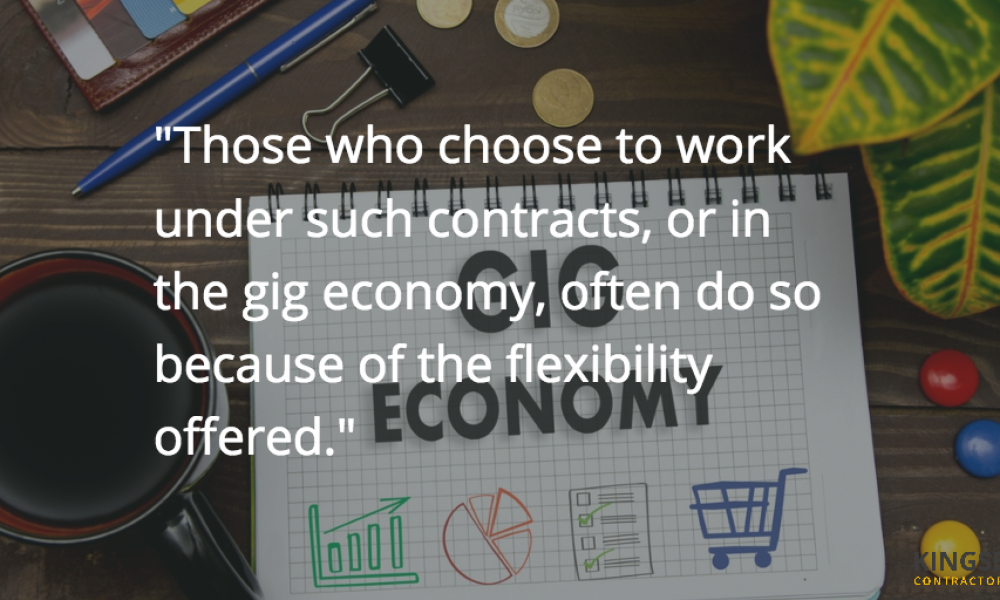There have been few economic debates in recent years as fevered and corybantic as the one surrounding the status of the gig economy.
Does it mark a new dawn of employment, a step-forward in individual autonomy which gives workers previously untold freedoms? Or is it little more than an unwelcome pariah, consuming entire industries and doing more harm than good?
The truth, as always, is probably found somewhere in between. It is unquestionable that services like AirBnB, Uber, and Deliveroo are revolutionary – explosive disruptors opening up closed doors and unsettling the complacent Luddites sat behind them.
They have given ordinary consumers an opportunity to utilise low-cost alternatives to options once considered a luxury, whilst at the same time redefining what it means to be self-employed.
Bored of 9-to-5? Want to try something different? The gig economy is there and offering new opportunities for you to learn and work at a pace and time that suits you.
Have some tools in your shed that you don’t use? A spare room in your house that could do with a guest? A parking space that could do with a car? There really is something for everyone.
But, at the same time, those who have been there to facilitate the extraordinary growth have found themselves left behind. With a workforce now estimated to be somewhere north of 5 million, there have been a series of legal tussles over the last few years surrounding the rights of gig economy workers and the responsibility of the multi-billion dollar firms who insist they are not employers but merely facilitators and middle men.
This assertion that they are nothing more than technology platforms who offer opportunities to the self-employed is more than a little disingenuous, and a number of high-profile tribunals have forced some of the biggest names in the sector to offer at least some concessions over holiday and sickness pay.
Some of its harshest critics see the gig economy as little more than a modern-day manifestation of the old-fashioned low-paid, low-skilled shift work which has driven employment growth in the UK since the financial crisis. Less blue collar, then, and more reflective windbreaker.
But if we take a step back and look at the broader picture in 2018 it becomes clear that flexible working has permeated a number of what are often viewed as well-paid, middle-class, secure professions – accountancy, management consultancy, teaching and so on. As a report published by the Resolution Foundation in February 2017 noted, it is “tax advantages over employees, rather than new technology and the gig economy, [that] are central to the rapid growth in self-employment.”
As you might expect the goverment has moved quickly to reduce to those tax advantages, proposing a raise in national insurance contributions for self-employed people. Alongside that, we’ve also seen a crackdown on IR35 (most prominently in the public sector) – those individuals who are, in essence, working as employees but are being paid through limited companies that avoid national insurance altogether for both employer and employee. The estimated dent in government tax receipts stemming from that avoidance runs into the billions.
Many critics of the gig economy have ascribed the stagnation of productivity levels in the UK since the financial crisis, as well as the issue of disguised underemployment in middle-class professionals, to its emergence.
Some also note another less-than-desirable consequence. Some companies see the hiring of workers in the gig economy as an opportunity to cut costs through not offering holiday pay, pensions, and other benefits. With these workers only being paid for the work they do, for many employers they seem to be a less risky proposition than other investments (machines or technology, for example) that could increase efficiency and lower costs in the long-term.
Since the financial crisis, zero hours contracts have risen from 143,000 to 900,000. Vocal critics, among whom the TUC are most prominent, have termed those contracts ‘abuse’ with workers little more than ‘disposable labour’ who earn less than a third of those on fixed hours.
But, as with many areas in a debate which is still evolving, there is another side of the coin. Those who choose to work under such contracts, or in the gig economy, often do so because of the flexibility offered. They choose their own hours and work at times preferable to them. Notably, when McDonalds introduced a right to switch from zero hours to fixed hours, only 20% of the workforce took them up on the offer.
At this nascent stage, we are still left with more questions than answers. Is the rise of the gig economy a natural evolution in choice in employment, or little more than a hi-tech plaster for a wounded economy? Is it the right of those in positions of power to intervene and protect workers’ rights when doing so runs the risk of reducing their employment options? Is the gig economy simply a mirror for changing expectations about the very nature of what a job is, or is it a catalyst for wholesale change in the employment market?
The answers to those questions and more are yet to be answered, but the progress of the gig economy will be one of the most interesting employment developments over the next few years. Keep tuned in to the Kingsbridge blog for future updates and analysis.
